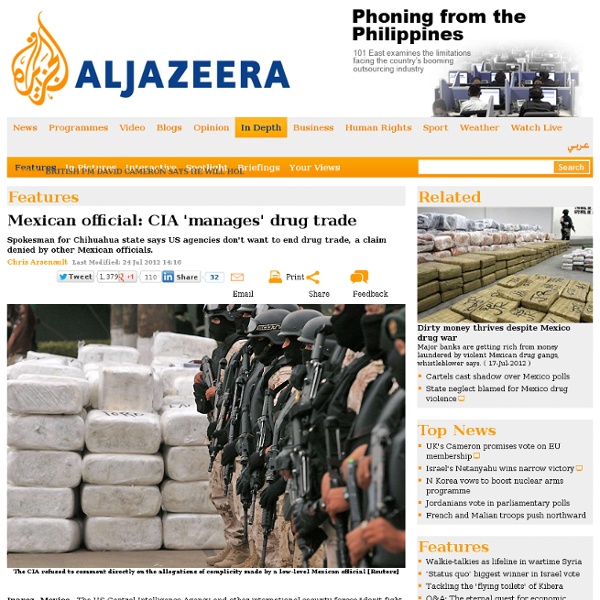Mexican official: CIA 'manages' drug trade - Features

Trafficking Networks and the Mexican Drug War
The abstract: Drug trade-related violence has escalated dramatically in Mexico during the past five years, claiming 40,000 lives and raising concerns about the capacity of the Mexican state to monopolize violence. This study examines how drug traffickers’ economic objectives influence the direct and spillover effects of Mexican policy towards the drug trade. Some numbers: . . . the probability that a drug trade-related homicide occurs in a municipality in a given month is 8.4 percentage points higher after a PAN mayor takes office than after a non-PAN mayor takes office. . . . the presence of a predicted drug trafficking route increases the value of illicit drug confiscations in a given municipality-month by around 18.5 percent. What happens when a law-and-order mayor gets elected? This map shows drug trade routs: Fascinating !!!
Study: 22 million Americans use illegal drugs
More than 22 million Americans age 12 and older - nearly 9% of the U.S. population - use illegal drugs, according to the government’s 2010 National Survey on Drug Use and Health. The overall rate of drug use is only slightly higher than the 2009 study but nearly a percentage point above the 2008 survey. “I am encouraged there were no significant increases in drug use over the past year,” Gil Kerlikowske, the U.S. director of national drug control policy, said in a statement. Marijuana, cocaine, heroin, hallucinogens, inhalants and some prescription drugs used for non-medical purposes were counted in the survey. In 2010, 7 million people used psychotherapeutic drugs (including stimulants, tranquilizers, painkillers and sedatives) for non-medical purposes, and 1.2 million people used hallucinogens, according to the study. One and a half million people used cocaine, similar to recent years' study results but a drop of nearly 1 million from 2006. Alcohol use Treatment
Related:
Related:



